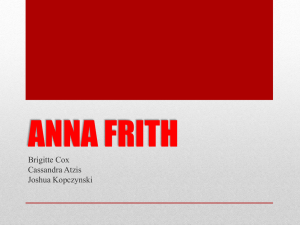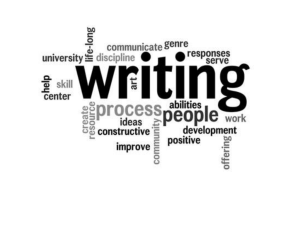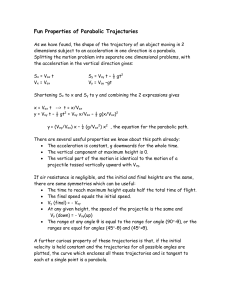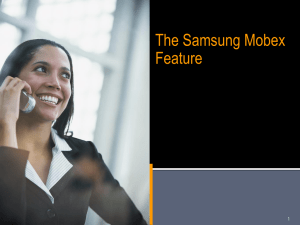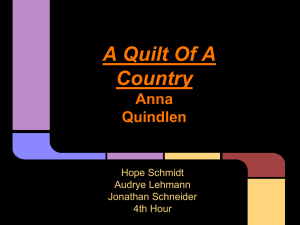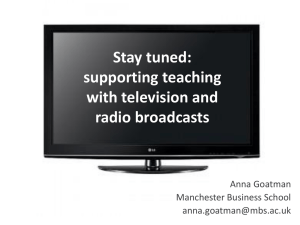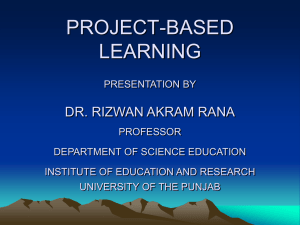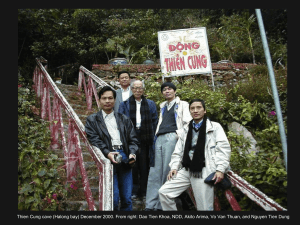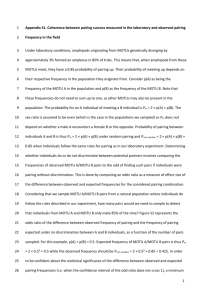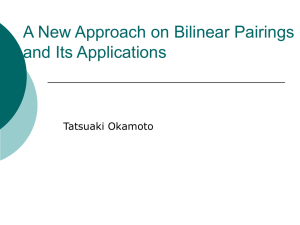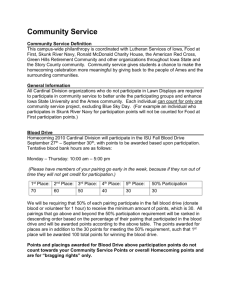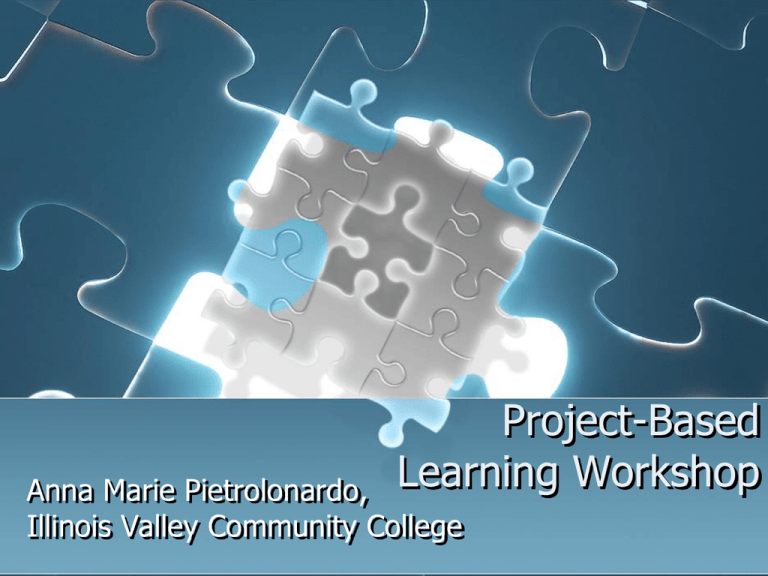
Project-Based
Learning Workshop
Anna Marie Pietrolonardo,
Illinois Valley Community College
Project-Based Learning
Session Agenda
Learn the Concepts
of Project-Based
Learning
Participate in
Project-Based
Learning during this
Workshop
Project-Based Learning
Session Agenda
Introduction
Group Introductions
& Goals
Objectives
Background
Definition of terms
Curriculum
Methodology
Application
Individual Work
Partner Pairing
Group Activities
Summary
Conclusion
Questions?
Group Introductions & Goals
What is your name, title, location?
What content areas, levels do you
teach?
How would you describe your current
teaching style?
What do you like most about it?
What would you like to improve?
What do you hope to take away from
this session?
Group Introductions & Goals
Grouping Possibilities
Subject(s) Taught
Level(s) Taught
Same Preferred Teaching Method(s)
Different Preferred Teaching Method(s)
Facing Same Challenge(s)
Other
Objectives
Enhance Student Skills in Subject Area
Develop Critical Thinking Skills
Engage Learners throughout the
Activity
Increase Long-Term Retention
Interrelate with Other Content Areas
Interrelate with Life Experience
Definition of terms
Definition of terms
Project-Based Learning
A learner-centered activity designed to
allow learners to acquire specific
competencies within the environment of a
real-world experience.
Definition of terms
Competency
Knowledge
A measureable, observable skill expressed
by action verbs according to Bloom’s
Taxonomy
Comprehension
Application
Analysis
Synthesis
Evaluation
Arrange
Account for
Adopt
Audit
Build
Accept
Choose
Calculate
Capitalize
Canvas
Cause
Decide
Describe
Define
Operate
Diagram
Form
Interpret
Find
Expound
Relate
Reason
Produce
Reject
Match
Propose
Solve
Study
Revise
Settle
Tally
Transform
Wield
Uncover
Yield
Weigh
(from Bloom’s
Taxonomy)
Definition of terms
Behaviorism
A “Traditional”
Learning Theory that
involves:
Recalling Facts
Defining Terms
Performing a Specific
Procedure
Focus on what
student needs to
know
Constructivism
A Learning Theory
that involves:
Building individual
interpretations of the
subject matter based
on personal and
group experiences
Focus on what
student will be able
to do
First Breakout Session
Identify Grouping Criteria
Form Groups with Common Interest
Share Ideas
Report Back on Highlights of Your
Discussion
Curriculum
Curriculum
Standards-based
Competency-based
Activity-based
Teamwork-based
Assessment embedded throughout
project through rubrics
Methodology
Based on Constructivist Principles
Learner-Centered, Activity-Based
Communicative Instruction & Modeling
Minimal “Lecture”
Focus on Critical Thinking Skill
Development
Focus on Life-Long Learning
Individual Work
Individual Work
Example: Recommended Study
Sequence
Embedded in Course Syllabus
Reinforced in
Course Orientation
Lesson Plans
Class Activities
First Assessment following Orientation
> Critical Thinking
> Time Management
Announcement in BlackBoard
Permanent -- Recommended Study
Sequence
If you are confused about how to
approach your assignments, here is a
suggestion:
• Refer to the Schedule of Assignments
for an overview of requirements and
goals at the beginning of each study
module.
Announcement in BlackBoard
• Carefully review the “Puntos clave”
table that relates directly to the
important things to learn from each
chapter in the text book. “Puntos clave”
are listed on the right column of the
Schedule for each chapter.
• Then, read those sections of the text
carefully.
Announcement in BlackBoard
• Next, use the HLC and BlackBoard –Course
Documents activities to help you learn the
new material.
• After you have done those things, you are
well-prepared for class activities. In that way,
you will already have the vocabulary,
grammar and cultural understanding from
the text resources to help you complete the
collaborative activities during each class
session.
Keep up the good work!
Individual Work
Example: Recommended Study
Sequence
Embedded in Course Syllabus
Reinforced in
Course Orientation
Lesson Plans
Class Activities
First Assessment following Orientation
Quiz Question
Individual Work
> Critical Thinking
Think Outside the Box
Just Think
Consider the Strategic Priorities
Order the Priorities
Adjust as Needed
...
> Time Management
Apply Critical Thinking to Temporal Constraints
Plan Your Work/Work Your Plan
Alan Lakein’s ABCs
...
Second Breakout Session
> Critical Thinking
Projects to Aid MY
Students in Developing
Critical Thinking Skills:
> Time Management
Projects to Help MY
Students Learn to Better
Manage Their Time:
Second Breakout Session
Form Groups with Common Interest
Share Ideas
Report Back on Highlights of Your
Discussion
Individual Work
Web Quests
Project-based learning features
Clear
objectives stated at onset
Not “just surfing”
Rubric – graded performance
Opportunity for Individual Choices
Relate to Real-World Experience in other
content areas
Develop life skills while studying target
language
Individual Work
Web Quest Project
For the course
Project you will
develop an
annotated list of 10
Web sites for a
curriculum area.
You can work alone,
in pairs, or in
groups of up to four
people.
The assignments
you complete
throughout the
course will
contribute toward
the course Project.
Use your best
searching
techniques to find
sites on your
subject.
Individual Work
Bookmark at least
15 sites for further
exploration.
Explore the sites,
delete the ones that
are not useful, and
annotate the ones
that are.
Choose the 10 best
sites. Include the
following
information with
each site.
name of the site
URL of the site
description of the
site
Individual Work
Create a bookmark
file. Save the file as
yourname.html. For
instructions on how
to do this, review
the instructions
given in Week 3,
Topic: Bookmarks.
Open this file with
your Web browser
(i.e., Internet
Explorer or Fire Fox)
and then copy and
paste the links into
a word processing
document.
Individual Work
Add annotations for the
URLs in the word
processing document.
Save this as a text file,
and copy your three
favorite sites to the
Forum with a brief
explanation of why you
chose these sites for
your Project.
You can also
exchange bookmark
files with your
partners if you are
working in pairs or
groups. Just send
the text file as an
email attachment.
Individual Work
Look at some
recommended sites
from your class
mates, and post
your comments on
them to the course
Forum. You can also
make suggestions
for other sites.
Evaluate your
Project using the
assessment rubric in
the Syllabus.
Do a final revision of
the Project.
Individual Work
Be sure to consider
any feedback you’ve
received from other
learners in this
course.
Submit your course
Project to the
Project Forum on
the Discussion
Board for evaluation
by the Project
Rubric.
Individual Work
End of Semester Capstone Performance
SPN-1001 –Cuando yo era niño/niña
Preterite/Imperfect
Past Tenses
Vocabulary
Real/embellished/imaginary
family
Personal photos/realia/clip art
Examples
Partner Pairing
Partner Pairing
In Class Practice
Eye-to-Eye/Knee-toKnee
Window/door
ESPP – En sus
propias palabras...
End of Chapter
Partner/Group
Performance BLN
Partner Pairing
Heinle Learning
Center in Quia
Internet-based
platform for textrelated study
Resources
Partner – pairing for
conversation and
voice recording.
Partner Pairing
Black Board Module Activities FOL
Instructions in Module Assignment
Posting Site in Discussion Forum
Students post threads to communicate
with classmates
Partner Pairing
Partner Pairing
Discussion Forum Posting Site:
Partner Pairing
Subject: El plan de la
semana
Voy a trabajar.
Voy a limpiar la casa.
Voy a lavar la ropa.
¿Te gusta trabajar?
¿Cuántos días limpia la
casa?
¿Te gusta cocinar?
Subject: El plan de la
semana
Voy a lavar la ropa en
la lavadora.
Voy a trabajar.
Voy a lavar la ropa.
¿Cómo era el trabajo?
¿Quién plancha la ropa
en la familia?
¿Usas la lavadora y la
secadora?
Partner Pairing
Text messages
Black Board (or other CMS) Discussion
Forum
G-mail accounts
Microsoft Office 2007 Groove
Yahoo Chat
Group Work
Group Work
In Class Practice
Sondeo (Survey)
POS Games – Sentence building
BB Group Activities FOL
End of Chapter Group Performance BLN
Lingua Franca Module
End of Semester Capstone Performance
Summary
Concluding Activity
If you would like to receive additional
information about Project-Based
Learning, please print your name, email address, land mail address and
affiliation/grades taught on the
Workshop Roster.
For more information, contact Anna
Marie Pietrolonardo
anna_pietrolonardo@ivcc.edu
Questions?
For more information, contact Anna Marie Pietrolonardo
anna_pietrolonardo@ivcc.edu
ANNA MARIE PIETROLONARDO
©2010 – ALL RIGHTS RESERVED

